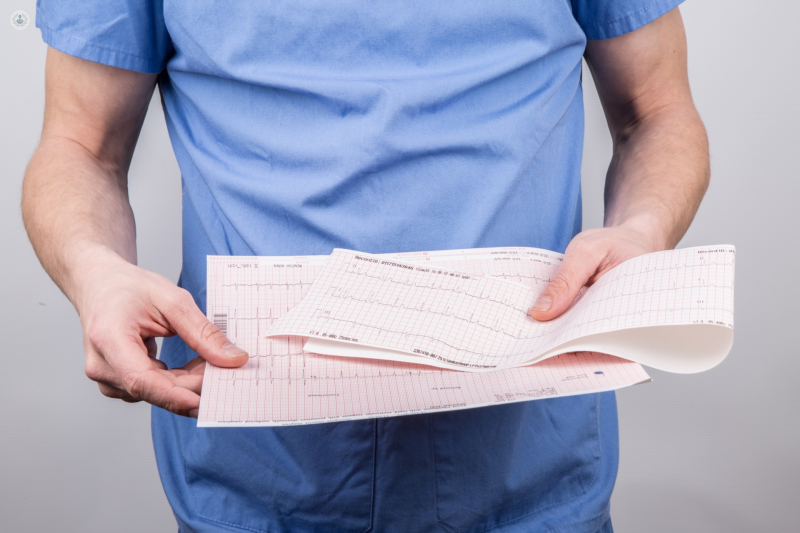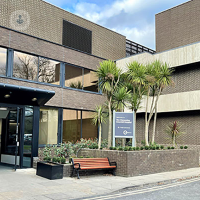What is urodynamic testing?
Urodynamic studies or urodynamic testing are tests which are carried out with the objective of understanding the functioning of the lower urinary tract, i.e. how well the bladder, urethra, and sphincters are able to hold and release urine.

What does it consist of?
There are various types of urodynamic test, and your urologist will recommend one, or more in some cases, depending on the symptoms which present. However, most urodynamic tests are all performed at once rather than individually. Some of the tests performed include:
- Uroflowmetry, which measures the speed of urine passed and how much is passed
- Cystometry, which measures how much urine the bladder can hold
- Pressure flow study, which measures the pressure in the bladder as you urinate
- Electromyography, which tests the pelvic floor muscles
Why is urodynamic testing performed?
Urodynamic testing is performed to diagnose pathologies such as urinary incontinence, neurological diseases that affect the urinary tract, urinary tract infections, etc. Testing may be performed to confirm:
- Neurological conditions affecting the bladder (myelodysplasias, spinal trauma, brain damage, etc.)
- Urinary incontinence in women and in men
- Recurrent urinary infections when anatomical causes are ruled out
- Urinary incontinence in children and enuresis (bedwetting)
- Urinary tract infections in children (when a functional cause is suspected)
- Lower urinary tract symptoms in men and women (frequent urination at night and day, urinary retention, burning when urinating, etc)
Preparation for urodynamic testing
Before the testing is carried out, your specialist or healthcare provider will speak to you about your symptoms and assess them. Prior to the urodynamic testing being performed, the specialist or doctor generally will perform a physical exam and conduct normal urine tests, which may help to provide a diagnosis before urodynamic testing is considered.
Either before or just after urodynamic testing is carried out, you will be given an antibiotic in order to prevent infection.
Urodynamic testing
What is urodynamic testing?
Urodynamic studies or urodynamic testing are tests which are carried out with the objective of understanding the functioning of the lower urinary tract, i.e. how well the bladder, urethra, and sphincters are able to hold and release urine.

What does it consist of?
There are various types of urodynamic test, and your urologist will recommend one, or more in some cases, depending on the symptoms which present. However, most urodynamic tests are all performed at once rather than individually. Some of the tests performed include:
- Uroflowmetry, which measures the speed of urine passed and how much is passed
- Cystometry, which measures how much urine the bladder can hold
- Pressure flow study, which measures the pressure in the bladder as you urinate
- Electromyography, which tests the pelvic floor muscles
Why is urodynamic testing performed?
Urodynamic testing is performed to diagnose pathologies such as urinary incontinence, neurological diseases that affect the urinary tract, urinary tract infections, etc. Testing may be performed to confirm:
- Neurological conditions affecting the bladder (myelodysplasias, spinal trauma, brain damage, etc.)
- Urinary incontinence in women and in men
- Recurrent urinary infections when anatomical causes are ruled out
- Urinary incontinence in children and enuresis (bedwetting)
- Urinary tract infections in children (when a functional cause is suspected)
- Lower urinary tract symptoms in men and women (frequent urination at night and day, urinary retention, burning when urinating, etc)
Preparation for urodynamic testing
Before the testing is carried out, your specialist or healthcare provider will speak to you about your symptoms and assess them. Prior to the urodynamic testing being performed, the specialist or doctor generally will perform a physical exam and conduct normal urine tests, which may help to provide a diagnosis before urodynamic testing is considered.
Either before or just after urodynamic testing is carried out, you will be given an antibiotic in order to prevent infection.


How to test your urine flow
By Mr Nikesh Thiruchelvam
2024-11-20
Urinary problems can be anything from difficulty in passing urine, going to the bathroom too often during the night, or even having the urge to go the toilet when you don't really need to. Leading Cambridge urologist explains just which methods are used to test your urine flow to find out what's going on. See more
Experts in Urodynamic testing
-
Mr Ali Omar
UrologyExpert in:
- Urinary incontinence
- Interstitial cystitis
- Urinary tract infection
- Bladder problems
- Urodynamic testing
- Cystocele
-
Mr John Hines
UrologyExpert in:
- Prostate cancer
- Bladder cancer
- Benign prostate enlargement
- Urinary tract infection
- Urodynamic testing
- Urogynaecology
-
Miss Fiona McCaig
UrologyExpert in:
- Urinary tract infection
- Urinary incontinence
- Urodynamic testing
- Bladder cancer
- Kidney infection
- Haematuria (blood in the urine)
-
Mr Jai Seth
UrologyExpert in:
- Urodynamic testing
- Urinary incontinence
- Benign prostate enlargement
- Urinary tract infection
- Female urology
- See all

Bishops Wood Hospital - part of Circle Health Group
Bishops Wood Hospital - part of Circle Health Group
Mount Vernon Hospital, Rickmansworth Rd, Northwood HA6 2JW
No existe teléfono en el centro.
By using the telephone number provided by TOP DOCTORS, you automatically agree to let us use your phone number for statistical and commercial purposes. For further information, read our Privacy Policy
Top Doctors

The Princess Margaret Hospital - part of Circle Health Group
The Princess Margaret Hospital - part of Circle Health Group
Osborne Rd, Windsor SL4 3SJ
No existe teléfono en el centro.
By using the telephone number provided by TOP DOCTORS, you automatically agree to let us use your phone number for statistical and commercial purposes. For further information, read our Privacy Policy
Top Doctors

The Clementine Churchill Hospital - part of Circle Health Group
The Clementine Churchill Hospital - part of Circle Health Group
Sudbury Hill, Harrow HA1 3RX
No existe teléfono en el centro.
By using the telephone number provided by TOP DOCTORS, you automatically agree to let us use your phone number for statistical and commercial purposes. For further information, read our Privacy Policy
Top Doctors
-
Bishops Wood Hospital - part of Circle Health Group
Mount Vernon Hospital, Rickmansworth Rd, Northwood HA6 2JW, West LondonExpert in:
- Vascular Surgery
- Cancer
- Cardiology
- General Surgery
- Neurological spinal surgery
- Orthopaedic surgery
-
The Princess Margaret Hospital - part of Circle Health Group
Osborne Rd, Windsor SL4 3SJ, WindsorExpert in:
- Brachytherapy
- Cardiology
- General Surgery
- Orthopaedic surgery
- Robotic Surgery
- Dermatology
-
The Clementine Churchill Hospital - part of Circle Health Group
Sudbury Hill, Harrow HA1 3RX, West LondonExpert in:
- Abdominal ultrasound
- Abdominoplasty
- Acne
- Allergies bronchopulmonary
- Allergies nose and ears
- Allergy Dermatitis
- See all
- Most viewed diseases, medical tests, and treatments
- Undescended testicle (Cryptorchidism)
- Testicular ultrasound
- Minimal access surgery (keyhole surgery)
- NanoKnife
- Vaginal dryness
- Pelvic pain syndrome
- Kidney stones
- Medicolegal
- Women's health
- Robotic surgery






